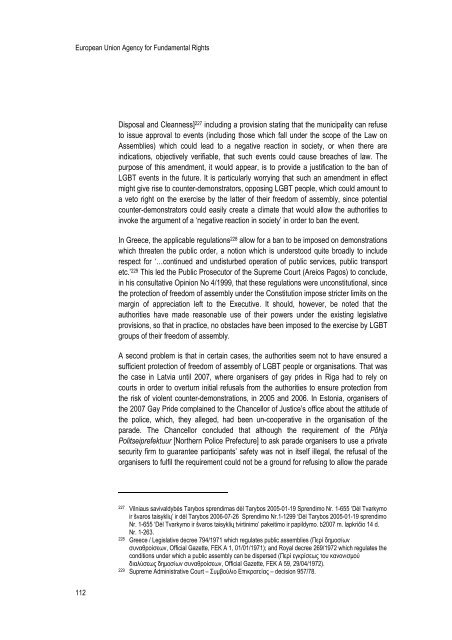European Uni<strong>on</strong> Agency for Fundamental RightsDisposal <str<strong>on</strong>g>and</str<strong>on</strong>g> Cleanness] 227 including a provisi<strong>on</strong> stating that the municipality can refuseto issue approval to events (including those which fall under the scope <strong>of</strong> the Law <strong>on</strong>Assemblies) which could lead to a negative reacti<strong>on</strong> in society, or when there areindicati<strong>on</strong>s, objectively verifiable, that such events could cause breaches <strong>of</strong> law. Thepurpose <strong>of</strong> this amendment, it would appear, is to provide a justificati<strong>on</strong> to the ban <strong>of</strong>LGBT events in the future. It is particularly worrying that such an amendment in effectmight give rise to counter-dem<strong>on</strong>strators, opposing LGBT people, which could amount toa veto right <strong>on</strong> the exercise by the latter <strong>of</strong> their freedom <strong>of</strong> assembly, since potentialcounter-dem<strong>on</strong>strators could easily create a climate that would allow the authorities toinvoke the argument <strong>of</strong> a ‘negative reacti<strong>on</strong> in society’ in order to ban the event.In Greece, the applicable regulati<strong>on</strong>s 228 allow for a ban to be imposed <strong>on</strong> dem<strong>on</strong>strati<strong>on</strong>swhich threaten the public order, a noti<strong>on</strong> which is understood quite broadly to includerespect for ‘…c<strong>on</strong>tinued <str<strong>on</strong>g>and</str<strong>on</strong>g> undisturbed operati<strong>on</strong> <strong>of</strong> public services, public transportetc.’ 229 This led the Public Prosecutor <strong>of</strong> the Supreme Court (Areios Pagos) to c<strong>on</strong>clude,in his c<strong>on</strong>sultative Opini<strong>on</strong> No 4/1999, that these regulati<strong>on</strong>s were unc<strong>on</strong>stituti<strong>on</strong>al, sincethe protecti<strong>on</strong> <strong>of</strong> freedom <strong>of</strong> assembly under the C<strong>on</strong>stituti<strong>on</strong> impose stricter limits <strong>on</strong> themargin <strong>of</strong> appreciati<strong>on</strong> left to the Executive. It should, however, be noted that theauthorities have made reas<strong>on</strong>able use <strong>of</strong> their powers under the existing legislativeprovisi<strong>on</strong>s, so that in practice, no obstacles have been imposed to the exercise by LGBTgroups <strong>of</strong> their freedom <strong>of</strong> assembly.A sec<strong>on</strong>d problem is that in certain cases, the authorities seem not to have ensured asufficient protecti<strong>on</strong> <strong>of</strong> freedom <strong>of</strong> assembly <strong>of</strong> LGBT people or organisati<strong>on</strong>s. That wasthe case in Latvia until 2007, where organisers <strong>of</strong> gay prides in Riga had to rely <strong>on</strong>courts in order to overturn initial refusals from the authorities to ensure protecti<strong>on</strong> fromthe risk <strong>of</strong> violent counter-dem<strong>on</strong>strati<strong>on</strong>s, in 2005 <str<strong>on</strong>g>and</str<strong>on</strong>g> 2006. In Est<strong>on</strong>ia, organisers <strong>of</strong>the 2007 Gay Pride complained to the Chancellor <strong>of</strong> Justice’s <strong>of</strong>fice about the attitude <strong>of</strong>the police, which, they alleged, had been un-cooperative in the organisati<strong>on</strong> <strong>of</strong> theparade. The Chancellor c<strong>on</strong>cluded that although the requirement <strong>of</strong> the PõhjaPolitseiprefektuur [Northern Police Prefecture] to ask parade organisers to use a privatesecurity firm to guarantee participants’ safety was not in itself illegal, the refusal <strong>of</strong> theorganisers to fulfil the requirement could not be a ground for refusing to allow the parade227Vilniaus savivaldybės Tarybos sprendimas dėl Tarybos 2005-01-19 Sprendimo Nr. 1-655 ‘Dėl Tvarkymoir švaros taisyklių’ ir dėl Tarybos 2006-07-26 Sprendimo Nr.1-1299 ‘Dėl Tarybos 2005-01-19 sprendimoNr. 1-655 ‘Dėl Tvarkymo ir švaros taisyklių tvirtinimo’ pakeitimo ir papildymo. b2007 m. lapkričio 14 d.Nr. 1-263.228Greece / Legislative decree 794/1971 which regulates public assemblies (Περί δημοσίωνσυναθροίσεων, Official Gazette, FEK A 1, 01/01/1971); <str<strong>on</strong>g>and</str<strong>on</strong>g> Royal decree 269/1972 which regulates thec<strong>on</strong>diti<strong>on</strong>s under which a public assembly can be dispersed (Περί εγκρίσεως του κανονισμούδιαλύσεως δημοσίων συναθροίσεων, Official Gazette, FEK A 59, 29/04/1972).229Supreme Administrative Court – Συμβούλιο Επικρατείας – decisi<strong>on</strong> 957/78.112
<str<strong>on</strong>g>Homophobia</str<strong>on</strong>g> <str<strong>on</strong>g>and</str<strong>on</strong>g> <str<strong>on</strong>g>Discriminati<strong>on</strong></str<strong>on</strong>g> <strong>on</strong> <strong>Grounds</strong> <strong>of</strong> <strong>Sexual</strong> Orientati<strong>on</strong> in the EU Member StatesPart I – Legal Analysisto take place. 230 In Germany, the obligati<strong>on</strong> <strong>of</strong> the authorities to protect thedem<strong>on</strong>strati<strong>on</strong> is limited to instances where Article 8 <strong>of</strong> the C<strong>on</strong>stituti<strong>on</strong> (Grundgesetz) isc<strong>on</strong>sidered to be exercised, which is the case for dem<strong>on</strong>strati<strong>on</strong>s c<strong>on</strong>veying a politicalmessage, but not for events such as ‘Love Parades’, which are c<strong>on</strong>sidered merely massparties with no political c<strong>on</strong>tent. 231 The result is that the organisers <strong>of</strong> such parades haveto cover the costs <strong>of</strong> the protecti<strong>on</strong> they are provided, instead <strong>of</strong> it being a duty <strong>of</strong> theauthorities to ensure such protecti<strong>on</strong>. 232 In Hungary, the police were criticised for havingprovided insufficient protecti<strong>on</strong> to the organisers <strong>of</strong> a Gay Pride in July 2007, which wasseverely disrupted by the violent acti<strong>on</strong>s <strong>of</strong> counter-dem<strong>on</strong>strators.While the incapacity <strong>of</strong> the police to ensure the peaceful character <strong>of</strong> the assembly is themost frequently used argument to justify a ban being imposed <strong>on</strong> dem<strong>on</strong>strati<strong>on</strong>s, theavailability <strong>of</strong> such a justificati<strong>on</strong> should be narrowly c<strong>on</strong>strued. A preventive ban <strong>on</strong> adem<strong>on</strong>strati<strong>on</strong> can <strong>on</strong>ly be justified in very excepti<strong>on</strong>al cases <strong>of</strong> force majeure, i.e. casesin which it is expected that maintenance <strong>of</strong> public order, notwithst<str<strong>on</strong>g>and</str<strong>on</strong>g>ing a substantialpolice presence <str<strong>on</strong>g>and</str<strong>on</strong>g> a substantial administrative effort, cannot be guaranteed. 233Finally, it may c<strong>on</strong>stitute a good practice for States to provide in their domesticlegislati<strong>on</strong> for an explicit obligati<strong>on</strong> imposed <strong>on</strong> the authorities to protect the exercise <strong>of</strong>freedom <strong>of</strong> assembly, 234 <str<strong>on</strong>g>and</str<strong>on</strong>g> for sancti<strong>on</strong>s <strong>on</strong> those who disrupt such exercise <strong>of</strong> theirfreedom <strong>of</strong> assembly by others. 235 The latter type <strong>of</strong> provisi<strong>on</strong>, however, is difficult todraft adequately <str<strong>on</strong>g>and</str<strong>on</strong>g> to apply in practice, since under the European C<strong>on</strong>venti<strong>on</strong> <strong>on</strong>Human Rights, in the presence <strong>of</strong> two groups <strong>of</strong> dem<strong>on</strong>strators c<strong>on</strong>veying c<strong>on</strong>flictingmessages, the nati<strong>on</strong>al authorities are not expected to ban <strong>on</strong>e <strong>of</strong> the messages in orderto allow the other message to be heard: instead, they are to create the c<strong>on</strong>diti<strong>on</strong>s230Est<strong>on</strong>ia/Õiguskantsleri kantselei (09.2007) ‘Soovitus õiguspärasuse ja hea halduse tava järgimiseks’[‘Recommendati<strong>on</strong> to observe legality <str<strong>on</strong>g>and</str<strong>on</strong>g> good governance’], letter to politseiprefekt [Police Prefect]Raivo Kütt, p. 13.231Federal C<strong>on</strong>stituti<strong>on</strong>al Court (Bundesverfassungsgericht), decisi<strong>on</strong> <strong>of</strong> 12th July 2001, case no.: 1 BvQ28/01 <str<strong>on</strong>g>and</str<strong>on</strong>g> 1BvQ 30/01.232A similar, albeit not identical, distincti<strong>on</strong> is made in Sweden under the the Public Order Act (1993:1617,Ordningslagen): events which are purely entertaining in purpose, rather than those which express aspecific message, are less str<strong>on</strong>gly protected against restricti<strong>on</strong>s.233For example, see in the Netherl<str<strong>on</strong>g>and</str<strong>on</strong>g>s Maastricht Regi<strong>on</strong>al Court, 22.03.2001, JB 2001/104.234For instance, in Finl<str<strong>on</strong>g>and</str<strong>on</strong>g>, under secti<strong>on</strong> 19 <strong>of</strong> the Assembly Act [koko<strong>on</strong>tumislaki (530/1999)] it is thespecific duty <strong>of</strong> the police to safeguard the exercise <strong>of</strong> the freedom <strong>of</strong> assembly. In Spain, Article 3 para.2 <strong>of</strong> the Organic Law 9/1983 stipulates that ‘The authority shall protect the assemblies <str<strong>on</strong>g>and</str<strong>on</strong>g>dem<strong>on</strong>strati<strong>on</strong>s against those who intent to avoid, disturb or affect the legal exercise <strong>of</strong> this right’. Seealso Article 11, Hungary/ Freedom <strong>of</strong> Assembly Act (1989. évi 3. törvény) (24.01.1989); Article 22,Lithuania / Lietuvos Respublikos susirinkimų įstatymas [Law <strong>of</strong> Assemblies]. Official publicati<strong>on</strong>Valstybės Žinios, 1993, Nr. 69-139; Art. 26, Slovenia/Public Gatherings Act 113/05 (30.11.2005).235In Finl<str<strong>on</strong>g>and</str<strong>on</strong>g>, Chapter 14, secti<strong>on</strong> 5 <strong>of</strong> the Penal Code imposes specific penalties for violati<strong>on</strong> <strong>of</strong> politicalrights (applicable e.g. where a pers<strong>on</strong> is prevented, by means <strong>of</strong> threats or violence, from expressinghis/her opini<strong>on</strong>s or from participating to a public meeting), while secti<strong>on</strong> 6 defines as a criminal <strong>of</strong>fencethe preventi<strong>on</strong> <strong>of</strong> an assembly. See also Article 514 para. 4 <strong>of</strong> the Spanish Penal Code, imposingsancti<strong>on</strong>s against any pers<strong>on</strong> who ‘impedes the legal exercise <strong>of</strong> the rights <strong>of</strong> assembly <str<strong>on</strong>g>and</str<strong>on</strong>g>dem<strong>on</strong>strati<strong>on</strong>, or disturbs gravely the development <strong>of</strong> an assembly or a dem<strong>on</strong>strati<strong>on</strong>’.113
















